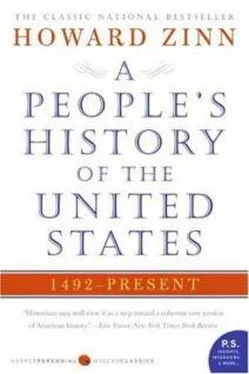Howard Zinn - A People
Здесь есть возможность читать онлайн «Howard Zinn - A People» весь текст электронной книги совершенно бесплатно (целиком полную версию без сокращений). В некоторых случаях можно слушать аудио, скачать через торрент в формате fb2 и присутствует краткое содержание. Издательство: Harper-Collins, Жанр: Фэнтези, на английском языке. Описание произведения, (предисловие) а так же отзывы посетителей доступны на портале библиотеки ЛибКат.
- Название:A People
- Автор:
- Издательство:Harper-Collins
- Жанр:
- Год:неизвестен
- ISBN:нет данных
- Рейтинг книги:4 / 5. Голосов: 1
-
Избранное:Добавить в избранное
- Отзывы:
-
Ваша оценка:
- 80
- 1
- 2
- 3
- 4
- 5
A People: краткое содержание, описание и аннотация
Предлагаем к чтению аннотацию, описание, краткое содержание или предисловие (зависит от того, что написал сам автор книги «A People»). Если вы не нашли необходимую информацию о книге — напишите в комментариях, мы постараемся отыскать её.
A People — читать онлайн бесплатно полную книгу (весь текст) целиком
Ниже представлен текст книги, разбитый по страницам. Система сохранения места последней прочитанной страницы, позволяет с удобством читать онлайн бесплатно книгу «A People», без необходимости каждый раз заново искать на чём Вы остановились. Поставьте закладку, и сможете в любой момент перейти на страницу, на которой закончили чтение.
Интервал:
Закладка:
In the 1720s, with fear of slave rebellion growing, white servants were allowed in Virginia to join the militia as substitutes for white freemen. At the same time, slave patrols were established in Virginia to deal with the "great dangers that may… happen by the insurrections of negroes…" Poor white men would make up the rank and file of these patrols, and get the monetary reward.
Racism was becoming more and more practical. Edmund Morgan, on the basis of his careful study of slavery in Virginia, sees racism not as «natural» to black-white difference, but something coming out of class scorn, a realistic device for control. "If freemen with disappointed hopes should make common cause with slaves of desperate hope, the results might be worse than anything Bacon had done. The answer to the problem, obvious if unspoken and only gradually recognized, was racism, to separate dangerous free whites from dangerous black slaves by a screen of racial contempt."
There was still another control which became handy as the colonies grew, and which had crucial consequences for the continued rule of the elite throughout American history. Along with the very rich and the very poor, there developed a white middle class of small planters, independent farmers, city artisans, who, given small rewards for joining forces with merchants and planters, would be a solid buffer against black slaves, frontier Indians, and very poor whites.
The growing cities generated more skilled workers, and the governments cultivated the support of white mechanics by protecting them from the competition of both slaves and free Negroes. As early as 1686, the council in New York ordered that "noe Negro or Slave be suffered to work on the bridge as a Porter about any goods either imported or Exported from or into this City." In the southern towns too, white craftsmen and traders were protected from Negro competition. In 1764 the South Carolina legislature prohibited Charleston masters from employing Negroes or other slaves as mechanics or in handicraft trades.
Middle-class Americans might be invited to join a new elite by attacks against the corruption of the established rich. The New Yorker Cadwallader Golden, in his Address to the Freeholders in 1747, attacked the wealthy as tax dodgers unconcerned with the welfare of others (although he himself was wealthy) and spoke for the honesty and dependability of "the midling rank of mankind" in whom citizens could best trust "our liberty amp; Property." This was to become a critically important rhetorical device for the rule of the few, who would speak to the many of «our» liberty, «our» property, «our» country.
Similarly, in Boston, the rich James Otis could appeal to the Boston middle class by attacking the Tory Thomas Hutchinson. James Henretta has shown that while it was the rich who ruled Boston, there were political jobs available for the moderately well-off, as "cullers of staves," "measurer of Coal Baskets," "Fence Viewer." Aubrey Land found in Maryland a class of small planters who were not "the beneficiary" of the planting society as the rich were, but who had the distinction of being called planters, and who were "respectable citizens with community obligations to act as overseers of roads, appraisers of estates and similar duties." It helped the alliance to accept the middle class socially in "a round of activities that included local politics… dances, horseracing, and cockfights, occasionally punctuated with drinking brawls…"
The Pennsylvania Journal wrote in 1756: "The people of this province are generally of the middling sort, and at present pretty much upon a level. They are chiefly industrious farmers, artificers or men in trade; they enjoy and are fond of freedom, and the meanest among them thinks he has a right to civility from the greatest." Indeed, there was a substantial middle class fitting that description. To call them "the people" was to omit black slaves, white servants, displaced Indians. And the term "middle class" concealed a fact long true about this country, that, as Richard Hofstadter said: "It was… a middle-class society governed for the most part by its upper classes."
Those upper classes, to rule, needed to make concessions to the middle class, without damage to their own wealth or power, at the expense of slaves, Indians, and poor whites. This bought loyalty. And to bind that loyalty with something more powerful even than material advantage, the ruling group found, in the 1760s and 1770s, a wonderfully useful device. That device was the language of liberty and equality, which could unite just enough whites to fight a Revolution against England, without ending either slavery or inequality.
Tyranny is Tyranny
Around 1776, certain important people in the English colonies made a discovery that would prove enormously useful for the next two hundred years. They found that by creating a nation, a symbol, a legal unity called the United States, they could take over land, profits, and political power from favorites of the British Empire. In the process, they could hold back a number of potential rebellions and create a consensus of popular support for the rule of a new, privileged leadership.
When we look at the American Revolution this way, it was a work of genius, and the Founding Fathers deserve the awed tribute they have received over the centuries. They created the most effective system of national control devised in modern times, and showed future generations of leaders the advantages of combining paternalism with command.
Starting with Bacon's Rebellion in Virginia, by 1760, there had been eighteen uprisings aimed at overthrowing colonial governments. There had also been six black rebellions, from South Carolina to New York, and forty riots of various origins.
By this time also, there emerged, according to Jack Greene, "stable, coherent, effective and acknowledged local political and social elites." And by the 1760s, this local leadership saw the possibility of directing much of the rebellious energy against England and her local officials. It was not a conscious conspiracy, but an accumulation of tactical responses.
After 1763, with England victorious over France in the Seven Years' War (known in America as the French and Indian War), expelling them from North America, ambitious colonial leaders were no longer threatened by the French. They now had only two rivals left: the English and the Indians. The British, wooing the Indians, had declared Indian lands beyond the Appalachians out of bounds to whites (the Proclamation of 1763). Perhaps once the British were out of the way, the Indians could be dealt with. Again, no conscious forethought strategy by the colonial elite, hut a growing awareness as events developed.
With the French defeated, the British government could turn its attention to tightening control over the colonies. It needed revenues to pay for the war, and looked to the colonies for that. Also, the colonial trade had become more and more important to the British economy, and more profitable: it had amounted to about 500,000 pounds in 1700 but by 1770 was worth 2,800,000 pounds.
So, the American leadership was less in need of English rule, the English more in need of the colonists' wealth. The elements were there for conflict.
The war had brought glory for the generals, death to the privates, wealth for the merchants, unemployment for the poor. There were 25,000 people living in New York (there had been 7,000 in 1720) when the French and Indian War ended. A newspaper editor wrote about the growing "Number of Beggers and wandering Poor" in the streets of the city. Letters in the papers questioned the distribution of wealth: "How often have our Streets been covered with Thousands of Barrels of Flour for trade, while our near Neighbors can hardly procure enough to make a Dumplin to satisfy hunger?"
Читать дальшеИнтервал:
Закладка:
Похожие книги на «A People»
Представляем Вашему вниманию похожие книги на «A People» списком для выбора. Мы отобрали схожую по названию и смыслу литературу в надежде предоставить читателям больше вариантов отыскать новые, интересные, ещё непрочитанные произведения.
Обсуждение, отзывы о книге «A People» и просто собственные мнения читателей. Оставьте ваши комментарии, напишите, что Вы думаете о произведении, его смысле или главных героях. Укажите что конкретно понравилось, а что нет, и почему Вы так считаете.












